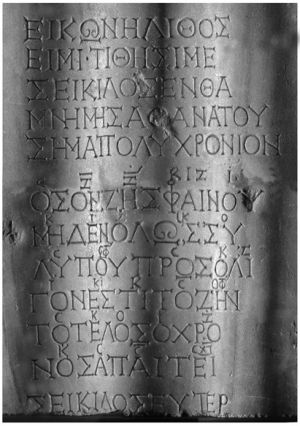Language/Modern-greek-1453/Culture/Seikilos-epitaph,-the-oldest-surviving-musical-composition

The Seikilos epitaph, the oldest surviving musical composition[edit | edit source]
The Seikilos epitaph, discovered to date, holds the distinction of being the earliest known complete musical composition in existence, inclusive of musical notation. This unique artifact from the ancient world is credited to Seikilos, a lyric poet and musician from the Hellenistic period. He is believed to have dedicated it to a woman named Euterpi - "Seikilos in Euterpi" - although her exact relation to him remains ambiguous. She could have been his wife, lover, sister, friend, daughter, or even just the personification of music, the Muse Euterpe.
This unique composition is inscribed on a compact, circular marble stele dating back to the 2nd century BC. W. M. Ramsay discovered it in 1883 near the ancient city of Tralles in Asia Minor. The stele was lost during the Asia Minor catastrophe in 1922, only to resurface later with a broken base - a woman had been using it as a plant holder, having sliced its base off horizontally. The original stele is currently displayed in the National Museum of Denmark, but authentic replicas are housed in various museums worldwide.
The inscription on the stele has two components: a dedication without melody and a song with corresponding musical symbols. The dedication at the base of the column reads: "ΕΙΚΩΝ Η ΛΙΘΟΣ ΕΙΜΙ.ΤΙΘΗΣΙ ΜΕ ΣΕΙΚΙΛΟΣ ΕΝΘΑ ΜΝΗΜΗΣ ΑΘΑΝΑΤΟΥ ΣΗΜΑ ΠΟΛΥΧΡΟΝΙΟΝ" - translating as "I, the stone, am an image. Seikilos places me here as a timeless sign of immortal memory."
This sentiment aligns with the Epicurean philosophy, "as long as we live, we must rejoice like the gods" as it emphasizes the impermanence of life and suggests that death is an inevitable finale with no continuance. The inscription thus embodies Epicurean principles: the joy of living, tranquility (ataraxia), and the inevitable end of life, death.
The song's lyrics, accompanied by its melody symbols, are centrally placed. The melody is recognized as of the Phrygian type.
| Ancient Greek | The so-called 'Seikilos Column'.
Performance in modern Greek |
English |
|---|---|---|
| ΟΣΟΝ ΖΗΣ ΦΑΙΝΟΥ,
ΜΗΔΕΝ ΟΛΩΣ ΣΥ ΛΥΠΟΥ. ΠΡΟΣ ΟΛΙΓΟΝ ΕΣΤΙ ΤΟ ΖΗΝ, ΤΟ ΤΕΛΟΣ Ο ΧΡΟΝΟΣ ΑΠΑΙΤΕΙ |
Όσο ζεις λάμπε,
καθόλου μη λυπάσαι. Για λίγο διαρκεί η ζωή, ο χρόνος απαιτεί την πληρωμή του. |
While you live, shine,
don't be sorry at all. Life takes a while time demands its payment. or While you live, shine have no grief at all life exists only for a short while and Time demands his due |


Video[edit | edit source]
Audio[edit | edit source]
The peace version in Civilization V:
A version under Creative Commons Attribution-Share Alike 2.5 Generic license:
https://en.wikipedia.org/wiki/Seikilos_epitaph
Author[edit source]
- Ευγενική χορηγία που στοχεύει να βοηθήσει μαθητές ή μη, απανταχού της Γης, που επιδίδονται στην εκμάθηση της ελληνικής γλώσσας!
- Contribution bénévole visant à aider les personnes, partout dans le monde, qui sont engagées dans l'apprentissage de la langue grecque !
- Voluntary contribution aimed at helping people, all over the world, who are committed to learning the Greek language!

